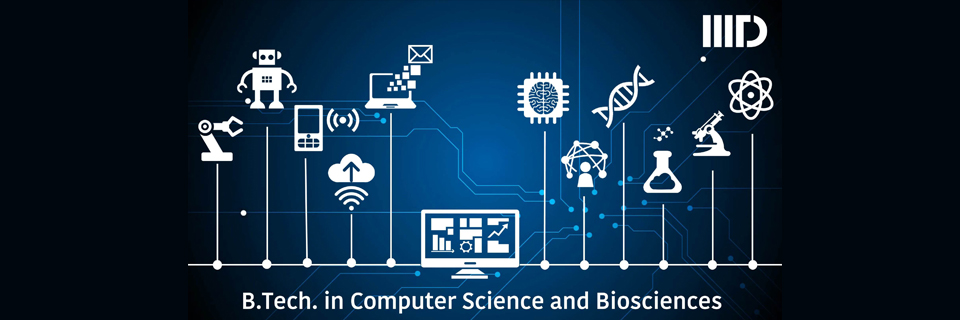With the advent of high-throughput techniques, biological sciences are grappling with a paradigm shift towards data-intensive explorations and challenges for management and analysis of massive data. Apart from fundamental contributions to basic science, data-driven analysis in biology has the potential to conquer challenges such as modeling and control of complex diseases, management and diagnosis of pathologies, personalized medicine, drug and vaccine design, among others. Making progress on these frontiers requires insight into biological processes, algorithms, machine learning techniques, mathematical modeling, apart from numerical and programming skills.
Thus, interdisciplinary education that imparts knowledge of foundations of biology and computer science as well as training in modeling and analysis of biomedical data is the key to create personnel who can provide solutions to problems on the interface of computation and biology. Knowledge of different aspects of modern biology and computational sciences will facilitate addressing relevant problems in biology and medicine. Towards this aim, an undergraduate program that seamlessly integrates foundations of computer science, biology and mathematics along with training to ask data-driven questions in biology and medicine is an important step in this direction.
- Understanding of foundations, capabilities and limits of computing.
- Ability to design and implement efficient software solutions particularly for biological applications using suitable algorithms, data structures, and other computing techniques.
- Understanding of foundations of biological sciences and biological data.
- Ability to compile, manage and analyze data to address problems in biological and medical sciences.
- Ability to build and apply mathematical modeling techniques to biological problems.
- Ability to function effectively in teams to accomplish a common goal.
- An understanding of professional and ethical responsibility.
- Ability to communicate effectively with a wide range of audiences.
- Ability to self-learn and engage in life-long learning.
- Ability to undertake research tasks and projects.
- Ability to take an idea and develop into a business plan for an entrepreneurial venture.
- Understanding of the impact of solutions in an economic, societal, and environment context.

Program Structure
The B.Tech. program at IIIT-D follows the philosophy of having a small set of core courses and many electives allowing students significant flexibility in designing their curriculum and specialization. The first semester program is common with other B.Tech. programs - this allows change of discipline after 1st Semester. 2nd , 3rd and 4th semester is mostly core courses. In the 3rd year, there are some core courses and rest are electives. In the final year, all courses are electives. Below is a list of some of the CSE & BIO electives.
Computer Science Electives
CSE courses that are regularly offered. These will likely to include courses like Computer Vision, Image analysis, Data Mining, Machine Learning, Pattern recognition, Statistical Computation etc.
Bioscience Electives
- Network Biology
- Systems Biology
- Biostatistics
- Machine Learning for Biomedical applications
- Computer aided drug discovery
- Big data mining in Healthcare
- Biomedical image analysis
- Introduction to Computational neuroscience

For B.Tech. (CSB), the program structure, regulations about the program, including the requirements for graduation and the Honors program, are available here.
Last updated: 10-09-2021



